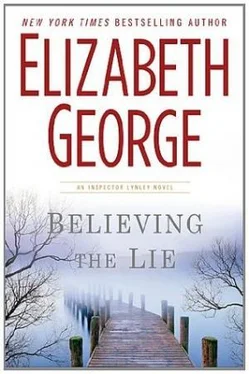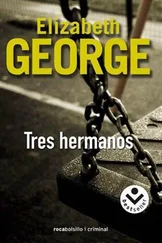“I hate Daddy’s house,” Gracie was adding in hopeful good measure. “There’re spiders every where. It’s dark and creaky and full of draughts and it’s got all these corners where there’re cobwebs and things. I want to live with you, Mummy. Timmy does ’s well.” She squirmed round in her seat. “ You want to live with Mummy ’s well, don’t you, Timmy?”
Don’t call me Timmy, you stupid twit, was what Tim actually wanted to say to his sister, but he couldn’t ever get mad at Gracie when she looked at him with that expression of trusting love on her face. When he saw it, though, he wanted to tell her to harden up. The world was a shit hole, and he couldn’t understand why she hadn’t yet worked that out.
Tim saw that his mother was watching him in the rear view mirror, waiting to hear how he would answer his sister. He curled his lip and turned to the window, thinking that he could almost not blame his father for dropping the bomb that had destroyed their lives. His mother was a real piece of work, she was.
The bloody cow was acting true to character, even now, all pretence about why they were heading back to Bryan Beck farm. What she didn’t know was that he’d picked up the phone in the kitchen the exact same moment she’d taken up the phone in her bedroom, so he’d heard it all: his father’s voice asking would she mind keeping the kids another night and his mother’s voice agreeing to do so. Pleasantly agreeing, for once, which should have told his father something was up, because it certainly told Tim as much. So he was unsurprised when his mother came out of the bedroom less than ten minutes later dressed to the nines and breezily told him to pack up because his father had phoned and he and Gracie had to go back to the farm earlier that evening than usual.
“Something nice he has planned for you,” she said. “He didn’t say what. So get yourselves together. Be quick about it.”
She went on to search for her car keys, which Tim realised he should have pinched. Not for his own sake, but for Gracie’s. She damn well deserved another night with their mother if that’s what she wanted.
She was saying, “See, there’s not even enough hot water for a proper bath, Mummy. And the water trick les out and it’s brown and disgusting. Not like your house where I c’n have bubbles. I do so like bubbles. Mummy, why can’t we live with you ?”
“You know very well,” Niamh Cresswell finally said.
“No, I don’t,” countered Gracie. “Most kids live with their mums when their parents get divorced. They live with their mums and they visit their dads. And you got bedrooms for us anyways.”
“Gracie, if you want so much to have all the details about the situation, you can ask your father why it’s different for you two.”
Oh right, Tim thought. Like Dad was actually going to give Gracie the facts on why they lived on some creeped-out farm in some creeped-out house on the edge of a creeped-out village where there was nothing to do on a Saturday night or a Sunday afternoon but smell the cow shit, listen to the sheep, or — and this would be if one was truly lucky — chase the village ducks from their stupid duck house and their holding pen into the stream across the lane. Bryanbarrow was the end of nowhere, but it was just perfect for their father’s new life. And about that life… Gracie didn’t understand. She wasn’t meant to. She was meant to think that they took in lodgers, only there was only one , Gracie, and after you go to bed where do you think he really sleeps and in what bed exactly and what do you think they do there when the door is closed?
Tim tore at the back of his hand. He dug in his nails till he broke the skin and felt tiny crescents of blood bubbles form. His face was a blank, he knew, because he’d perfected that expression of absolutely nothing going on in his head. That and the hands and the damage he could do to them and his overall appearance kept him where he wanted to be, which was far away from other people and far away from everything else. His efforts had succeeded, even, in getting him out of the local comprehensive. Now he attended a special school near Ulverston, which was miles and miles and miles from his father’s house — all the better to cause a mind-boggling inconvenience to him every day, naturally — and miles upon miles from his mother’s house and that was the way he wanted it because there, near Ulverston, no one knew the truth of what had happened in his life and he needed it that way.
Tim watched the passing scenery, silent. The drive from Grange-over-Sands to his father’s farm spun them north in the fading daylight, up through the Lyth Valley. There the landscape was patchwork: paddocks and pastures that were the green of shamrocks and emeralds and that, like a wave, rolled into the distance to swell up to the fells. On these, great outcroppings of slate and limestone burst forth, with grey scree fanning out beneath them. Between the pastures and the fells stood groups of woodland, alders that were yellow with the autumn and oaks and maples that were gold and red. And here and there erupted buildings that marked the farms: great hulking stone barns and slate-fronted houses with chimneys from which wood smoke curled.
Some miles along, the landscape altered as the wide Lyth Valley began to close in. With that closure came the advent of woods, and the leaves from their trees banked the road, which began to wind between drystone walls. It had started to rain now, but when didn’t it rain in this part of the world? This part of the world was known for its rain, and the result was moss thickly growing on the stones of the walls, ferns shoving themselves out of crevices, and lichens underfoot and on the bark of the trees.
“It’s raining,” Gracie said unnecessarily. “I hate that old house when it rains, Mummy. Don’t you, Timmy? It’s horrible there, all dark and damp and creepy and horrible .”
No one replied. Gracie dropped her head. Their mother made the turn into the lane that would take them up to Bryanbarrow, quite as if Gracie had not spoken at all.
The road here was narrow, and it proceeded upwards in a series of hairpin bends that carved a route through woodland of birch and chestnut trees. They passed Lower Beck farm and a disused field that was thick with bracken; they coursed along Bryan Beck itself, crossed it twice, climbed a bit more, and finally swung into the approach to the village, which lay below them, nothing much more than the juncture of four lanes giving onto a green. That it had a public house, a primary school, a village hall, a Methodist chapel, and a C of E church made it a gathering place of sorts. But only on evenings and Sunday mornings, and even then those gathered in the village either drank or prayed.
Gracie began to cry as they crept over the stone bridge. She said, “Mummy, I hate it here. Mummy. Please.”
But her mother said nothing, and Tim knew she wouldn’t. There were certainly feelings to consider in this matter of where Tim and Gracie Cresswell would live, but the feelings were not those of Tim and Gracie Cresswell. That was the way it was and the way it would be, at least till Niamh gave up the ghost or finally just gave up, whichever came first. And Tim wondered about this last, he did. It seemed that hate could kill a person, although when he thought about it, hate hadn’t yet killed him so perhaps it wouldn’t kill his mother either.
Unlike so many farms in Cumbria, which maintained a distance from villages and hamlets, Bryan Beck farm sat just at the edge of the village, and it comprised an ancient Elizabethan manor house, an equally ancient barn, and an even more ancient cottage. Beyond these the farm’s pastures opened up, and in these grazed sheep, although they were not the property of Tim’s father but rather belonged to a farmer who rented the land from him. They lent the farm “an authentic look,” Tim’s father liked to say, and were in keeping with “the tradition of the Lakes,” whatever that was supposed to mean. Ian Cresswell was no bloody farmer and as far as Tim was personally concerned, the stupid sheep were a great deal safer with his father keeping his distance from them.
Читать дальше












